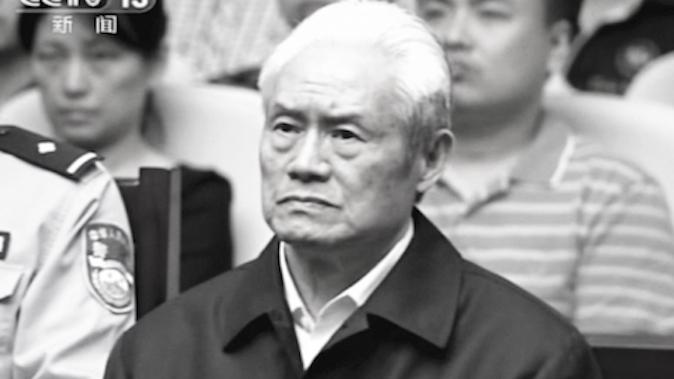The son and wife of Zhou Yongkang, the disgraced Chinese Communist Party security boss, have recently been handed lengthy jail terms, according to Chinese state media.
On June 15, state mouthpiece Xinhua announced that Zhou Bin, the 44-year-old son, and Jia Xiaoye, the 47-year-old second wife of Zhou Yongkang, were charged with bribery and other crimes when the elder Zhou was in power.
Yichang Intermediate People’s Court in the central China province of Hubei sentenced Zhou Bin, a businessman, to 18 years jail, and fined him 350 million yuan (about $53 million). Jia Xiaoye, a former China Central Television journalist, was handed a 9-year prison term, and fined 1 million yuan (about $155,000). Both pleaded guilty.
Zhou Bin and Jia Xiaoye are the latest persons connected to Zhou Yongkang to be punished for leveraging the elder Zhou’s prominent position to enrich themselves.
According to Caixin, a Chinese financial publication, Zhou Bin had used his father’s political influence to build a sprawling billion-dollar commercial empire in China and abroad. He was arrested in December 2013, likely as part of preliminary investigations into Zhou Yongkang.
Little is known of Jia Xiaoye, Zhou Yongkang’s second wife. Caixin claims that Li Dongsheng, a former high-ranking security official, had introduced Jia to Zhou Yongkang in 2001 with hopes of winning political favor. Li was made deputy minister of public security two years after Zhou took over the regime’s security apparatus—even though Li had no background in the security system.
In recent years, Zhou’s close allies in the lucrative state oil sector, like Jiang Jiemin and Liao Yongyuan, and aides like Ji Wenlin, have been investigated by the Party’s internal disciplinary agency, and later charged and handed long prison stints.
The Security Czar
When the stone-faced Zhou Yongkang became chief of the Political and Legal Affairs Commission—a small but powerful Party organ—and sat on the Politburo Standing Committee in 2007, he turned the regime’s security apparatus into his personal fief.
Zhou won a larger budget than that of the People’s Liberation Army, and soon became so influential that overseas Chinese press described him as a rival political center to that of then Party leader Hu Jintao.
Even after Zhou stepped down in 2012, his stamp lingers: Luo Yu, the son of revolutionary leader Luo Ruqing, described the present security apparatus as “Zhou Yongkang’s security system without Zhou Yongkang in it.”
Given his standing, Zhou was presumed by many to be safe from Party leader Xi Jinping’s anti-corruption campaign. But he was formally investigated in July 2014, and given a life prison sentence in June 2015, ostensibly for corruption and divulging state secrets.
Zhou, however, was guilty of more horrific crimes during his tenure as security czar.
In the lead up to the 2008 Beijing Olympics, Zhou used the bloated police and paramilitary units to brutally suppress Tibetans, Uyghurs, house Christians, prisoners of conscience, and practitioners of Falun Gong, a traditional Chinese spiritual discipline.
Zhou has also been blamed by the Party’s own spokespeople for overseeing the forced organ harvesting of prisoners. The former deputy health minister, Huang Jiefu, made this charge in an interview with a pro-Beijing television broadcaster. Huang did not mention the widespread suspicion that prisoners of conscience, primarily practitioners of Falun Gong, have been slaughtered en masse for their organs. But he described the industry as “murky and intractable,” a potential hint that he was instructed to reveal that more was afoot than the mere use of death row prisoner organs.
Incidentally, the recent sentencing of Zhou’s son and second wife follows the passage of H.Res.343, in which the House of Representatives called for the Chinese regime to end forced organ harvesting of Falun Gong practitioners.
A similar sequence of events—whether coincidental or not is unclear—occurred in 2013 after the European Parliament passed a similar resolution to oppose forced organ harvesting in China. A little over a week after the resolution, Party investigators arrested Li Dongsheng, the man who introduced Zhou Yongkang to his second wife. At the time of his arrest, Li also headed the “610 Office,” an extralegal, Gestapo-like organization created for the express purposes of carrying out the persecution of Falun Gong.





